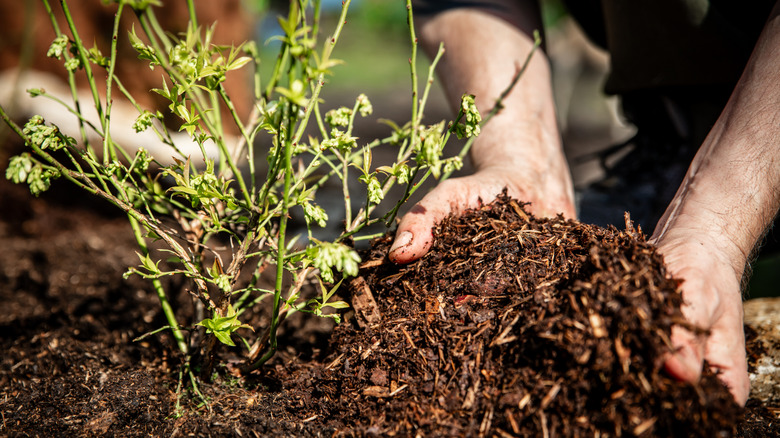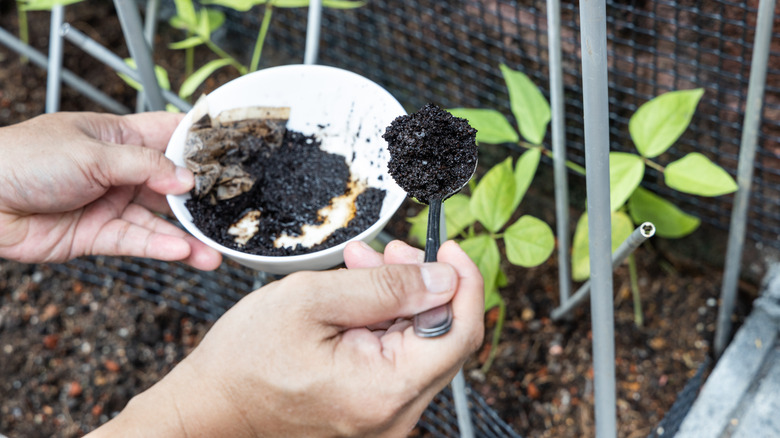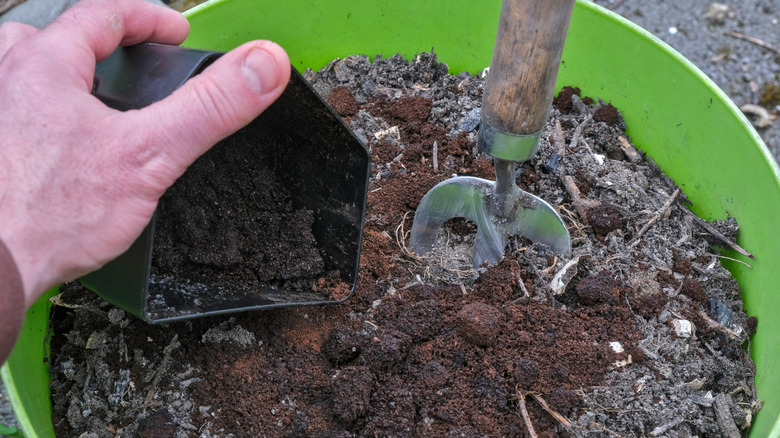The Best Way To Use Coffee Grounds Alongside Mulch In The Garden
It's no secret that leftover coffee grounds can be a great fertilizer for your yard. While it's not really true that coffee grounds help lower the soil's pH level, the abundance of carbon, nitrogen, and other compounds in coffee can help feed your garden's micro-ecosystem and suppress some microbes that cause disease. The caffeine content can also suppress the growth of certain plants, reducing competition for soil nutrients, though this may affect your plant life as much as it does those pesky weeds. That said, coffee grounds work as an excellent supplement to mulches, which are typically used for various gardening benefits including controlling soil moisture and temperature, preventing erosion or spoilage, and reducing the severity of diseases like blights. With overlapping benefits, the best way to use coffee grounds alongside mulch is by properly layering these additions to your garden.
A number of organic mulches are popular gardening materials, including various wood products (bark, wood chips, and shredded wood mulch), straw, grass clippings, pine needles, and compost. Man-made products and byproducts like cut-up newspaper or sawdust are also effective means of mulching your soil. Regardless of what you choose, the best way to mix mulch with coffee grounds is actually to not mix them at all. Instead, a compacted layer of coffee grounds — no more than half an inch or so — should be laid out over the soil. Upwards of four inches of the coarser mulch material can then be layered atop that, creating multiple walls for retaining moisture and protecting the soil from disturbances by untimely breezes.
Coffee can benefit a garden in multiple ways
Coffee grounds don't need to be layered with mulch to provide benefits to your backyard endeavors of growing practical produce or aesthetic flowers. As previously mentioned, compost makes a great candidate for mulching. Compost is the result of natural materials like leaves or veggies decomposing over time, making it an ideal way to recycle food waste and benefit the environment. The grounds left over from your morning drip can also be added into your compost bin, but you'll want to be careful not to ruin the compost with too much coffee. Only about 20% of your compost should be coffee grounds by volume, but try to add a diversity of materials. Biodegradable coffee filters can also be thrown into the mix.
There are ways you can use coffee grounds to deter pests from your garden as well, which has just as many benefits as mulching. A 2% solution of coffee grounds in water is effective at dealing with slugs in your yard, driving them away from any drenched plants and preventing them from returning at the risk of caffeine poisoning. This is arguably better than using table salt to deal with your slug problem, as high concentrations of the stuff can also cause damage to the plants you're protecting via salt toxicity.
Plants that take the most benefits from using coffee grounds in your garden
Although mixing coffee grounds into your mulch and compost could suppress some of the plant growth you're hoping for, there are also plenty of benefits for the soil. For example, coffee grounds are able to increase how much water the growing medium holds, which is especially useful for sandy soils and loams with more clay content. The process of brewing coffee also results in hot water leeching away all of the coffee we want to consume, leaving important non-soluble materials behind. Oils, lipids, fatty acids, and antioxidant compounds like lignin add value back to the soil, hopefully leading to healthier blooms.
If coffee grounds mixed with your mulch are able to correct a lack of water retention in the soil, this means different kinds of plants become more accessible in your garden. For example, wet soils are great for growing plants such as Hydrangea macrophylla, or Actaea (also known as baneberry). Of course there are also home-grown plants that don't like coffee grounds as fertilizer, such as lilacs and roses. Just make sure you're doing your due diligence by researching the kinds of flora you want to populate your garden, as leftover coffee grounds should be used in moderation to avoid any pronounced negative consequences.


